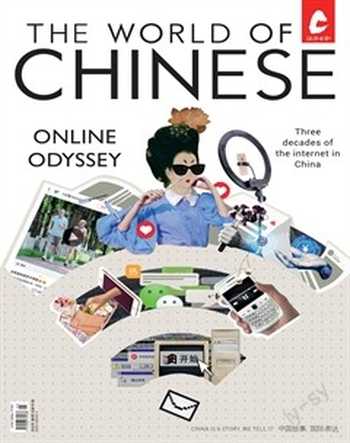玩转中国股市,从学炒股“黑话”开始
2023-12-14孙佳慧
孙佳慧

Stock Phrases
Ride the roller coaster of the stock market with this guide to investor jargon and slang
Like thrill-seekers at an amusement park, Chinas investors are used to sudden ups and downs. Nowadays, even young Chinese born in the 2000s (known as “post-00s”) are boarding the stock market roller coaster, and theyre bringing a host of new terms to complement the existing jargon of the financial industry.
To understand when the 过山车 (guòshānchē, roller coaster) of Chinas stock market is heading for disaster, one needs to be well-versed in not only specialized stock market terminology but also the language of internet memes.
For example, basic operations like buying or selling a stock or fund are often expressed with metaphors related to vehicles. To buy a fund is to 上车 (shàngchē, board the car); to close out a trade is 下车 (xiàchē, get off the car); and selling out a fund to buy a new one with the proceeds is 换车 (huànchē, change car). Investors have to be careful though, as any wrong move can lead to 翻車 (fānchē, rolling a car), signifying substantial losses after investing in an underperforming stock.
Some investors believe that frequent “car changing” is more likely to lead to a rollover, so they stick to the “buy and hold” strategy. Their motto is 做时间的朋友 (zuò shíjiān de péngyou, be the friend of time). No matter how the market changes, they tend not to sell their shares in the hope that this loyalty will pay off with gains in the long term. On the internet, this strategy is often dubbed 卧倒 (wòdǎo, lying down) or, perhaps disparagingly, 躺平 (tǎngpíng, lying flat).
No matter what, I will buy and lie flat.
Mǎiwán tǎngpíng, ài zǎ zǎ dì.
买完躺平,爱咋咋地。
Riding the roller coaster
Clearly, investing can be a bumpy ride. Funds that fluctuate dramatically in value are referred to as roller coasters, not just because of investors fluctuating earnings, but also the emotional ups and downs that follow.
Look at my roller coaster earnings!
Kànkan wǒ zhèxiē guòshānchē shōuyì!
看看我这些过山车收益!
Extreme adrenaline junkies may choose to 梭哈 (suōhā), or “go all in.” 梭哈 is the transliteration of the English “show hand,” a term often used in stud poker.
Its time to go all in tonight.
Shíjī yǐ dào, jīnwǎn suōhā.
时机已到,今晚梭哈。
Of course, this often backfires. As their savings plummet, unfortunate investors who poured too much into failing companies face despair. In 2011, after stocks of Chongqing Brewery suffered days of drastic losses that triggered a cease in trading of the shares, a depressed investor published a post titled “Crying While Eating” on the online forum Baidu Tieba: “After coming back home today, I cooked some noodles. I cried while eating. The tears dropped into the bowl, and I didnt turn the lights on.” The phrase 关灯吃面 (guāndēng chīmiàn, turning off the lights and eating noodles) quickly caught on with investors suffering losses. Nowadays, investors say they are “eating noodles” when they are losing money and 吃肉 (chīròu, eating meat) when their investment is trending up.
Choose the right fund to invest in and you can eat meat every day.
Xuǎnduì jījīn, tiāntiān chīròu.
选对基金,天天吃肉。
Cutting losses
Some are lucky enough to buy a stock at the perfect time, sit back, and relax as they watch its value rise serenely. These fortunate buyers are said to 坐轿 (zuòjiào, sit in a sedan chair).
They are boosted even further by those who buy in after the stock has already begun to rise—their money helps boost the share price further, or 抬轿 (táijiào, carry the sedan chair), mainly benefiting those already seated comfortably having invested earlier.
I spent the whole year doing nothing but carrying the sedan chair for others.
Zhè yì nián guāng gěi rén táijiào le.
这一年光给人抬轿了。
One of the most important skills for investors is knowing when to cut their losses. But selling low isnt easy, since gamblers (sorry, “investors”) always hold out hope that those squiggly lines on the stock dashboard will turn and theyll ride the roller coaster back to the summit. Cutting ones losses on a stock is therefore referred to as 割肉 (gēròu, cutting meat), indicating that selling a stock or fund at a low price is as painful as cutting off ones own flesh.
The stock has dropped by 10 percent. Its time to cut meat.
Zhè zhī gǔpiào diēle bǎi fēnzhī shí le, gāi gēròu le.
这支股票跌了百分之十了,该割肉了。
Clear-eyed investors know that as long as their money is in the markets, its at risk. They argue that 落袋为安 (luòdài wéiān), literally “money is only safe when its in your bag,” to encourage investors to cash out.
Unsurprisingly, many ignore this and instead tend to 追涨杀跌 (zhuīzhǎng shādiē, buy when the price is rising and sell when its dropping). The losses these people incur from these poor investment decisions make them 韭菜 (jiǔcài,, leeks), a metaphor for greenhand investors who blindly follow the trends with their money and often end up losing it, or 被收割 (bèi shōugē, getting harvested).
Fortunately, leeks grow back quickly. When a new batch of stockholders flood into the market, the once harvested, now more experienced investors can offer valuable advice:
Investment is risky. Be careful before entering the market.
Tóuzī yǒu fēngxiǎn, rùshì xū jǐnshèn.
投資有风险,入市需谨慎。
